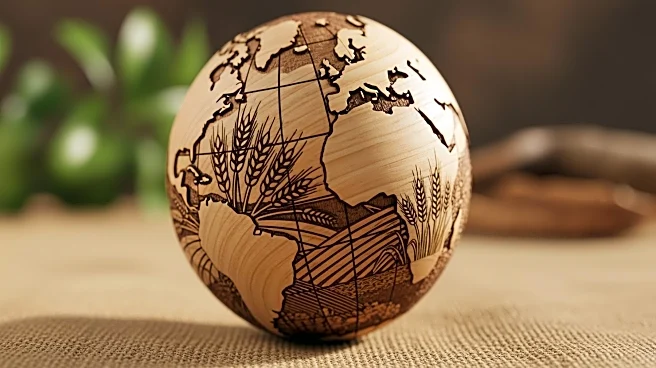What's Happening?
Rabobank's Agri Commodity Outlook 2026 indicates a shift in the global agricultural landscape, where geopolitical factors are overtaking traditional market forces in determining trade flows, prices, and production decisions. The report highlights a division
between the United States and China, with agricultural commodities becoming strategic tools in geopolitical conflicts. Trade wars have led to tariffs and subsidies that are reshaping production and export patterns, resulting in a fragmented, policy-driven global food system. Carlos Mera, Head of Agri Commodity Markets Research at Rabobank, notes that agriculture is now governed by geopolitical rules rather than supply-and-demand dynamics. The report also discusses the impact of tariffs and subsidies on global grain and oilseed prices, predicting subdued prices for 2026 due to sustained high planted areas.
Why It's Important?
The shift towards geopolitically driven agriculture has significant implications for global trade and economic stability. As countries like the US, Brazil, Indonesia, Argentina, and Russia intensify agricultural support programs, the traditional market response to price changes is muted, potentially leading to inefficiencies and market distortions. For US farmers, the geopolitical tension with China has resulted in reduced soybean plantings and increased corn production, affecting commodity stock levels and price volatility. This geopolitical fragmentation could lead to persistent or increased geographic price differentials, impacting global trade dynamics and economic relations. Stakeholders in agriculture, including farmers, traders, and policymakers, must adapt to a landscape where trade disruptions and government interventions are the norm.
What's Next?
The ongoing geopolitical struggle is expected to continue influencing global agriculture, with trade disruptions, fluctuating regional prices, and heavy government intervention likely to persist. US authorities are reviewing tariffs on non-domestic products like coffee and cocoa, which may ease consumer costs and restore trade flows. As the geopolitical 'middle game' progresses, unexpected events and further trade barriers could arise, requiring stakeholders to remain vigilant and adaptable. The report suggests that the agricultural sector must prepare for a future where geopolitical factors are a primary driver of market conditions.
Beyond the Headlines
The geopolitical influence on agriculture raises ethical and strategic questions about the role of food security in international relations. As countries use agricultural commodities as leverage in geopolitical conflicts, the potential for unintended consequences, such as food shortages or price spikes, increases. This development may also prompt discussions on the sustainability of current agricultural practices and the need for international cooperation to ensure equitable access to food resources.
















